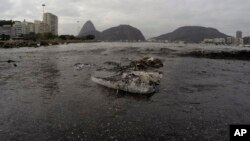It's no secret that the quality of the ocean and bay waters where some of the Rio Olympics sporting events are taking place are far from ideal.
But many officials and athletes are trying to make the best of the situation now that the games are here and events are happening.
“We've been getting water reports from the World Health Organization every month for the last year and we feel very confident that this is going to be a great event,” Sid Cassidy told VOA.
Cassidy is the head referee for men's Marathon Swimming which will take place August 16 in the Atlantic Ocean off renowned Copacabana Beach. The women compete in their race the day before.
The marathon swim is contested in open water where the athletes do four loops that total 10 kilometers.
A highly-ranked marathon swimmer himself decades ago, Cassidy says most swimmers will naturally ingest some water during part of the approximately two-hour race.
“I think most of them will wear earplugs and take the precautions that they can in advance with any kind of prophylactic drugs that are coming out to prevent any kind of diseases from coming through. But to tell you the truth, I've been in this game since the 1970s and we've seen a lot of events in the last 40 or 50 years in much, much worse water quality than this.”
Cassidy said representatives were sent to Rio last year for an Olympic test event where well over 100 racers competed, and they were pleased with what he called the “diligence at the beach.” He said the water quality in the ocean is not as big of an issue as it is for the sailors who will compete in Guanabara Bay, where raw sewage enters daily.
He said naturally there's concern for every athlete about any health issues in Rio, be it the water or the Zika virus.
“I think sometimes things get a little blown up in the media,” Cassidy remarked. “One media group tries to make a bigger train wreck (blows it more out of proportion) than the next. They understand in a sport like swimming, this is our Super Bowl, this is our biggie, this is our World Cup if you are a soccer player. There's nothing bigger than an Olympic gold medal for a swimmer, as they've put years and years of training into it. And they've put their faith and trust into the people that are leading this event and we're very excited. We're thinking that we're going to be okay.”
A bigger issue than the coastal Atlantic is Guanabara Bay, where the Olympic sailing events will take place this week. While it is extremely scenic, what is in the water is not so pleasant, as it is laced with raw sewage that flows into it every day. It was not sufficiently cleaned up before the Rio Summer Games as promised.
But there's nothing the athletes can do at this point except take precautions. Switzerland's Maja Siegenthaler, who will be competing in her first Olympics in the women's 470 sailing event, told VOA it's something they just have to deal with.
“There are other places in the world I have been sailing and there the water is dirty as well. And obviously we can't change it. We have to handle it. We clean our hands. We take showers. We took all the steps to prevent illness. And actually for everybody it's the same, and we will not think about it during sailing,” she said.
“Especially for the mind it's important to stay flexible,” said her Swiss teammate Yannick Brauchli, who sails in the men's 470 class. “That's most important, not to get angry because of this. Of course it's there, the rubbish and everything, and everyone can hit something. It's really just like that and you need to be flexible.”








